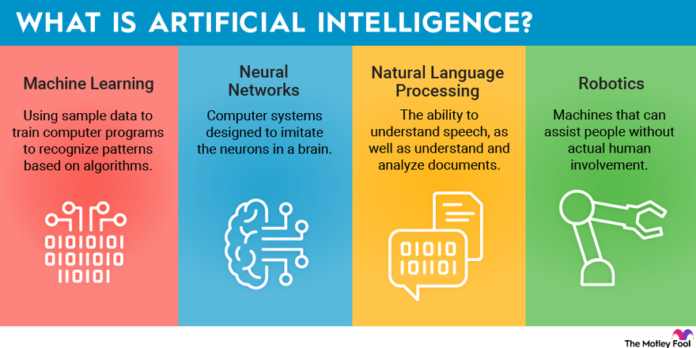In an era dominated by technological marvels, the term “Artificial Intelligence” (AI) often takes center stage. In this comprehensive exploration, we aim to demystify the concept, providing a clear understanding of what artificial intelligence is, its historical evolution, and the transformative impact it holds across various industries.
1. Understanding Artificial Intelligence
At its essence, Artificial Intelligence refers to the development of computer systems designed to perform tasks that typically require human intelligence. This encompasses a broad spectrum, from problem-solving and speech recognition to learning and adaptation. Understanding the foundational concept of AI sets, the stage for unraveling its complexities.
2. The Evolution of Artificial Intelligence
Embarking on a journey through the history of AI unveils a fascinating narrative. From ancient mythological concepts to the emergence of modern AI during the mid-20th century, tracing its evolution provides valuable insights into the forces that shaped this revolutionary technology.
3. Types of Artificial Intelligence
AI is not a one-size-fits-all entity. It exists in various forms, each with distinct capabilities. Delve into the categories of AI, distinguishing between Narrow AI (Weak AI) designed for specific tasks and General AI (Strong AI) possessing human-like cognitive abilities. This exploration sets the groundwork for understanding AI’s versatility.
4. Machine Learning
Machine Learning (ML) emerges as a pivotal subset of AI, empowering systems to learn from data and improve their performance over time without explicit programming. Explore the principles of ML, including supervised learning, unsupervised learning, and reinforcement learning, as key components driving the continuous advancements in AI.
5. Natural Language Processing
Natural Language Processing (NLP) stands out as a crucial element in AI, enabling machines to understand, interpret, and generate human language. Uncover the applications of NLP, from voice assistants and language translation to sentiment analysis, as it facilitates seamless communication between humans and machines.
6. Computer Vision
The realm of Computer Vision allows machines to interpret and make decisions based on visual data. Explore the diverse applications of Computer Vision, ranging from facial recognition and image classification to the development of autonomous vehicles, revolutionizing industries and enhancing daily life.
7. Robotics and Automation
AI’s integration with robotics results in intelligent machines capable of performing physical tasks. Examine how robotics and automation, powered by AI, have transformed industries, including manufacturing, healthcare, exploration, and logistics.
8. AI in Healthcare
One of the most impactful applications of AI is witnessed in healthcare. Discover how AI is revolutionizing diagnostics, personalized medicine, and treatment planning, offering unprecedented advancements in patient care and medical research.
9. Ethical Considerations in AI
As AI becomes more pervasive, ethical considerations come to the forefront. Delve into the ethical challenges surrounding AI, including bias in algorithms and the implications of AI on privacy, autonomy, and decision-making.
10. The Future of Artificial Intelligence
Looking ahead, the trajectory of AI promises continued innovation and integration into various facets of our lives. Explore potential future developments, including the rise of Explainable AI (XAI), the ethical evolution of AI, and the societal implications of AI-driven advancements.
Author Opinion:
In conclusion, Artificial Intelligence emerges not merely as a technological marvel but as a dynamic force shaping the very fabric of our existence. Understanding what artificial intelligence is, from its foundational principles to its current applications and future trajectories, becomes not only a pursuit of knowledge but a crucial step towards navigating the transformative impact of this revolutionary technology responsibly and proactively.

